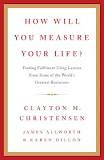I recently read the book How Will You Measure Your Life? by Clayton Christensen, a professor at Harvard Business School. The book is a good read with practical advice for making decisions that keep you moving toward who you want to be and where you want your organization/career to go.
The takeaway nugget for me was a point he made about the dangers of marginal thinking in business decision-making.
It's hard to ignore what you've already invested in
Marginal thinking focuses on the additional cost or benefit of a possible decision rather than looking at the big picture that might need to be reinvented entirely.
In the late 1990s, Blockbuster dominated the home movie rental industry in the US. From a business standpoint, to maximize revenues, They needed movie renters to watch the movies and get them back to the store to increase turn. Late fees were charged, escalating every day to encourage customers to return videos on time. Analysts estimated that perhaps 70 percent of Blockbuster's profits were from those late fees.
But imagining a clean slate can help prevent losing it all
In comes Netflix, a newcomer who addressed those annoying fees
from a customer’s standpoint and created a nearly opposite profit model. Customers paid a monthly fee to rent as many videos as they wanted and the company made money when people didn't return their DVDs because the company didn't have to pay return postage and still got the monthly fee.
from a customer’s standpoint and created a nearly opposite profit model. Customers paid a monthly fee to rent as many videos as they wanted and the company made money when people didn't return their DVDs because the company didn't have to pay return postage and still got the monthly fee.
Blockbuster evaluated the idea of developing a postal business to compete with Netflix. But all the investment that had been put into its brick-and-mortar stores skewed decision makers to conclude that it was not worth doing. Making that decision would essentially cause them to compete against their existing business. And that focus on the cost or benefit of making the change rather than the value of the idea from a clean slate ended up costing them everything.
Netflix by contrast had nothing to lose and nothing to protect. By 2011, Netflix had almost 24 million customers. Blockbuster had declared bankruptcy.
When you’re the leader, it's easy to assume that the future will be exactly the same as the past, but at some point the world changes in a significant way, making it unwise to protect the old way of doing things.
The new guys see the potential and have less to lose in going after an emerging need in the market. They can see more clearly because they don't have the experience of success in doing it a way that may not be the best way going forward.
A good reminder! Think long-term. Be willing to risk changes now for a significantly better future.





No comments:
Post a Comment